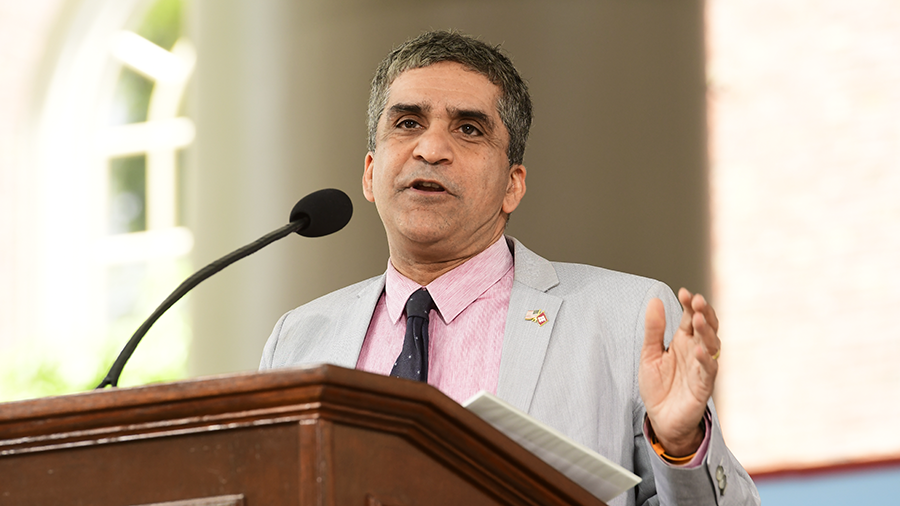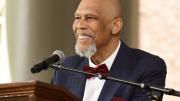There are more similarities than one might expect between graduating from Harvard and retiring from the NBA, the legendary basketball player, writer, and activist Kareem Abdul-Jabbar told graduating seniors at their Class Day ceremony on Wednesday afternoon.
When he retired, “there were cheering crowds, a deep sense of accomplishment, and funny clothes—though I admit that academic robes are much classier than the Lakers tank top and shorts,” said the 19-time NBA All-Star and six-time NBA champion. “And you don’t need a jockstrap.”
Beyond the sense of celebration, Abdul-Jabbar said, he also had a “nervous trepidation about the future”: a feeling he expected many graduates were experiencing, too, as they sat in Tercentenary Theatre beneath leafy trees and the afternoon spring sun. “Where do I go from here? Who do I want to be? There's so much pressure after a major accomplishment for us to go on and do even more, greater things.”
For Abdul-Jabbar, it took some time to figure it out. (“There aren’t many options when you’re 7’2,” he explained.) Eventually, though, he found his calling in writing about politics, sports, and African American history, authoring over 20 books, contributing to major media outlets, and now publishing regularly on his Substack.
In many ways, this was a pivot: “What does skyhooking a ball through a hoop have to do with eloquent sentences, nuanced metaphors, and keen social insight?” he asked. But both his basketball and writing careers were motivated by the same value, he said: a commitment to justice and the fight against racism.
That commitment sometimes required personal sacrifice. In 1968, Abdul-Jabbar shared, he turned down an offer to play on the United States Olympic basketball team—a decision that cost him a childhood dream and dealt a blow to his reputation. “Dr. Martin Luther King, Jr., had been assassinated [that] April, and civil rights for black people were starting to feel like a fading dream,” he said. “I couldn't bring myself to become a smiling symbol of the promise of the United States’ multiracial democracy, when it was doing everything it could not to fulfill that promise.”
He drew inspiration, then and now, from King. Abdul-Jabbar quoted King’s words: “Human progress is neither automatic nor inevitable.…Every step toward the goal of justice requires sacrifice, suffering, and struggle.” That truth, to him, is encapsulated in the story of Rosa Parks, he said—not just the successful desegregation of the Montgomery bus system after the bus boycott, but what came after, the years of continued struggle, including the 1956 bombing of King’s home by segregationists.
“What affected me most about Dr. King’s response to that bombing was his comment: ‘Remember that if anything happens to me, there will be others to take my place,’” Abdul-Jabbar said. “He was so confident that others would step in and continue the fight against injustice.”
Abdul-Jabbar told students that in Harvard, he sees evidence that King’s confidence was justified. “One of the reasons I'm so pleased to be here today is because I view Harvard University as being among the others willing to take Dr King’s place,” he said.
After waiting for the audience’s applause to die down, he continued: “After seeing so many cowering billionaires, media moguls, law firms, politicians, and other universities bend their knee to an administration that is systematically strip mining the U.S. Constitution, it is inspiring to me to see Harvard University take a stand for freedom.”
Looking out at the soon-to-be graduates, Abdul-Jabbar encouraged them, too, to become those “others”—the ones who step up in times of injustice, grounded by their core values even as their paths lead to unexpected places.
That theme was echoed earlier by Danoff Dean of the College Rakesh Khurana, who is also, in a way, graduating—stepping down from his role with the end of the academic year. The transition prompted him to reflect on his own undergraduate experience at Cornell University in Ithaca, New York. He compared the journey graduates are taking now to Odysseus’s voyage home to Ithaca in The Odyssey (which, having lasted 10 years, he noted, is just one year shorter than his deanship).

“How you see your Ithaca—with what vision, what values, what integrity—matters enormously,” Khurana said. “But it also matters that you're open to traveling with the intention of seeing it for the first time.”
Correction (May 30, 2025): A previous version of this article misquoted Kareem Abdul-Jabbar as saying “towering billionaires.” He in fact said “cowering billionaires.”









